5 Different Types of Pool Heaters: Which One is Best?
-
- Last updated:
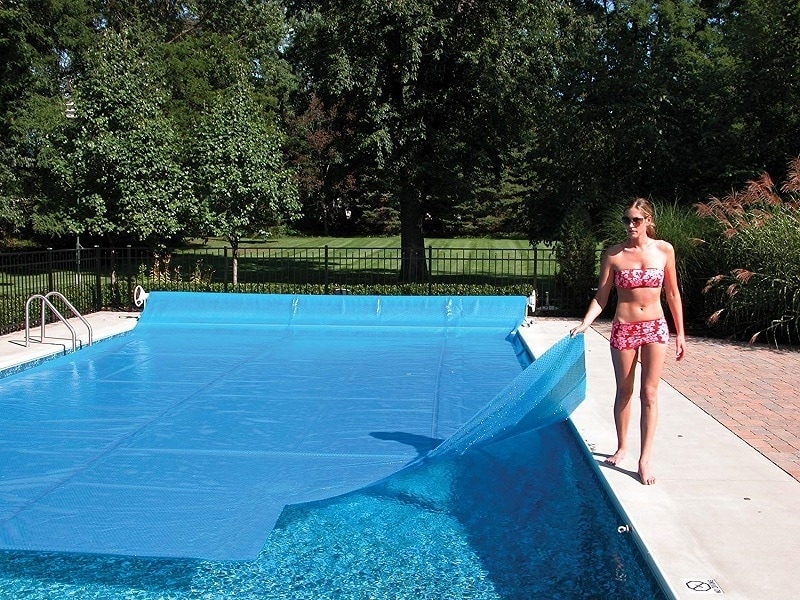

If you are looking to heat your pool, one of the first things you are going to need to consider is what type of healer he will use. There are five main types of heaters, and we’ll discuss each of them for both above and below ground pools. We’ll also talk about the pros and cons of each type of heater.
Keep reading for a detailed look at each of these heaters where we talk about the cost of installation, the cost of operation, BTUs, and more to help you make an educated purchase.

Early Considerations
A heater can extend the operating season of your pool by allowing you to open it earlier and keep it open longer into the cold season. There are, however, some downsides to heating your pool. Let’s look at the pros and cons.
Besides extending the pool season, heating your pool also allows you to maintain a more comfortable water temperature daily. Heating will reduce the adjustment time when you get in the pool, and it can help keep the temperature even in pools that get cold often do to shade or unseasonable climate.
The downside to pool heaters is that the warmer water will use chlorine much faster. Algae and bacteria both like the warmer temperatures better as well.
- Extended pool season
- Consistent temperatures
- Reduced initial adjustment
- Increased chemical use
- Increased cost
- Risk of algae and bacteria growth
The 5 Types of Pool Heaters
Let’s list the five different kinds of heaters for pools and the pros and cons of each.
1. Solar Cover
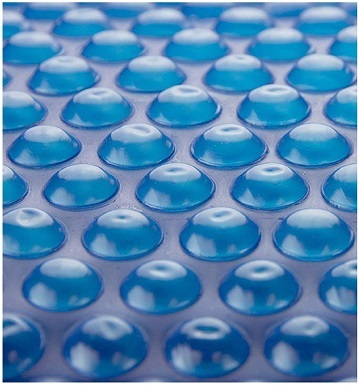
The easiest and cheapest way to heat your pool water is going to be with a solar cover. A solar cover resembles a large piece of bubble wrap that you place over your pool directly on the water like a cover. The plastic bubbles concentrate the sunlight and transfer the heat to the water, and one of these covers can heat the pool by several degrees on a hot sunny day. There is no installation, and no fee to use it once you’ve purchased it. You can use a solar cover on an above ground pool or an inground pool.
There are two significant downsides to this type of heat. The first is that it requires a sunny day, and it will not warm your water on a cloudy day or at night. The second downside is that even with the pool filter running, the warmer water will collect near the solar cover. This warm water pocket will destroy the chlorine very quickly and allow algae and bacteria to grow, which often leads to cloudy water.
- Inexpensive
- No ongoing fees
- No installation
- Requires sun
- Promotes algae and bacteria growth
- Can cause cloudy water
2. Heat Pump
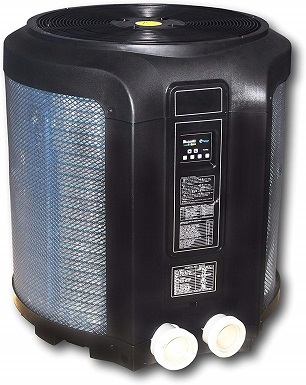
Heat pumps are similar to air conditioners, but they work in reverse. This type of heater has a higher initial cost than many of the other types of heaters, but it is more efficient, and usually cheaper to run from season to season and requires less maintenance. There are brands of heat pumps for above ground and in-ground pools
The biggest downside to the heat pump is that it doesn’t work very well in cold weather. It requires a temperature of 45 degrees or more to heat the water. This type of heater is great if you often find your pool a little chilly, but the temperature change is slow, and it will not allow your pool to run year-round.
- Less expensive to run than gas or electric
- Efficient
- Only works in warmer weather
- Very gradual warming
3. Gas
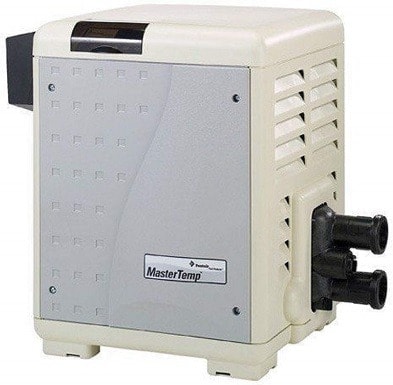
A gas heater is not very different from a standard household water heater. This type of heater is the most effective at raising the temperature of your water. In some cases, it can increase the temperature as much as one degree per hour, and this is the best type of heater to use if you want to run your pool year-round.
The downside to these heaters is that many inground pools require you to hook up a permanent gas line, and this will need professional installation and a gas line near your pool. Many above-ground heaters will run on propane tanks, but these will require continuous replacing and refilling. In both cases, the cost of heating your pool will fluctuate from year to year, depending on the current fuel prices in your area.
- Fast heat
- Allows year-round operation
- Requires installation
- Fluctuating fuel cost
- May require a gas line
4. Electric
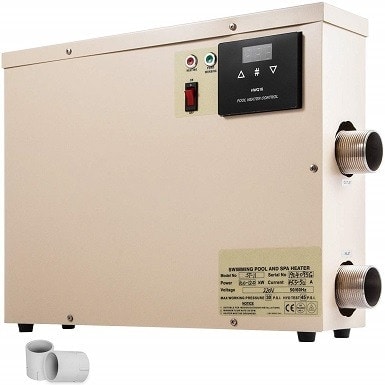
Electric pool heaters are one of the least expensive heaters to purchase and are similar to the new tankless water heaters you might find in a home. These electric heaters work great to heat your shower, and they would also do an excellent job in a spa or hot tub, but swimming pools often contain too much water to warm in this way, and the electric bill will be very high. These units can only increase the temperature very gradually, even when used with a small body of water. Electric heaters are available for above ground and in-ground pools,
- Small size
- Inexpensive to install
- Expensive to run
- Only for small pools
- Gradual temperature increase
5. Solar
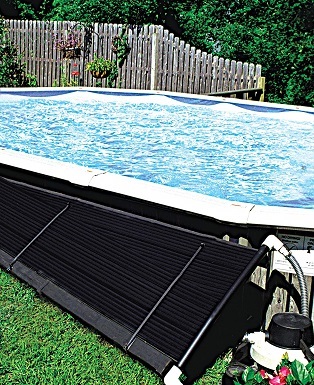
We’ve mentioned solar covers, but another type of solar heater uses panels to warm the water. These solar heaters are not that different from the electric heaters we just talked about, but instead of using electricity, they transfer the heat from the solar panels into the water as it passes through the unit. You can install the solar panels in multiple locations, including the roof or on the ground.
The downside to these heaters is that they will once again only heat the water a little and are far better for smaller amounts of water, or for raising the temperature a few degrees in your pool. It will also only work on sunny days, though it can still work in low light conditions. In some cases, the solar panels can charge cells that allow heating to take place at night. These units are also useful for cooling down the water, if that is what you desire, by running it at night. While solar panel heating is available for above ground pools, we see it more on inground pools with the panels permanently placed on the roof.
- No fuel or electricity requirements
- Multiple installation locations
- Can cool water as well as heat
- Gradual heating
- Requires sunlight
- Better for smaller pools

Conclusion
That covers the five different ways to heat your pool. We recommend starting with the solar cover with the filter on to see if that delivers enough heat. If you want to hit the pool year-round, you’re going to need to go with a gas heater. If you don’t have a gas line close enough to your pool, you can use propane. We also recommend propane if you want to do the installation yourself. If you’re only looking to warm the water a small amount (and extend your full season a few weeks), any of the other models will be excellent.
If we have given you some new ideas, and you have enjoyed reading, please share this guide to the different types of pool heaters on Facebook and Twitter.
Contents

